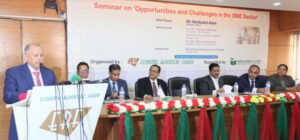 Economic Reporters Forum (ERF) organized Seminar on ‘Opportunities and Challenges in the SME Sector’ on Monday
Economic Reporters Forum (ERF) organized Seminar on ‘Opportunities and Challenges in the SME Sector’ on Monday
MM Rahmatullah: While the SME sector contributes 40 to 60 percent to the GDP of neighboring and competing countries, Bangladesh still accounts for less than 30 percent. But there is no alternative to the SME sector to sustain the large industry and advance the country’s economy. Therefore, to advance the SME sector, it is necessary to facilitate banking finance, provide skills training to learn about the market and create documentation, create a separate cell or ministry for ASME and provide necessary policy support. If it is possible to do this, the potential of the SME sector can be exploited.
The speakers of the seminar titled ‘Opportunities and Challenges in the SME Sector’ organized by the Economic Reporters Forum (ERF) on Monday said these things. Besides, they think that the bankers need to change their mentality, so that the bankers take care of the financing for the development of the sector with real compassion.
ERF President Refayet Ullah Mirdha presided over the seminar held at the ERF office in Old Paltan of the capital. ERF General Secretary Abul Kashem presided over the event.
Speaking as the chief guest at the seminar, FBCCI president, the top business organization, Mahbubul Alam said that in developed countries, big producers buy backward linkages from small entrepreneurs. As a result small and big entrepreneurs are created in the same industry. He gave an example, like Toyota manufactures the car engine, all the other parts are manufactured from outside. But in our country the elders do not give opportunities to the younger ones, they make everything themselves. Many large groups also make Chanachur Muri. Small entrepreneurs need bank financing to overcome this tax disparity. But SME entrepreneurs are not getting the required financing. Financing is still a major problem here. Due to procedural complications, many funds are available but the actual beneficiaries are not getting them. The interest rate of those who are getting it also becomes 12-14 percent.
He also said that there are many reasons behind not getting bank loans. One of these is not being able to produce the documents that the bank wants due to lack of skills. He also said that due to the lack of skills, there are various problems in entering the international market.
Mehmud Hossain, Managing Director of National Bank, said that there are psychological problems in lending to the SME sector. A loan requires many documents. But bankers, entrepreneurs are not interested in this. Lack of skills is one of the reasons. Due to this lack of interest, the SME sector is lagging behind.
He said that banks in Bangladesh have set loan targets for the SME sector. But achieving that is challenging.
Dhaka Chamber President Samir Sattar said, apart from access to finance, four major steps are now needed for the SME sector. These are – taking out medium enterprises from SMEs, providing various types of government policy support including tax waiver and LC margin layer to pull the war-affected SME sector, providing necessary training to entrepreneurs to make them suitable for entering the international market and creating a separate SME ministry.
He said, political will is needed for the SME sector, so that the government can provide maximum services to the SME sector. Big industries cannot survive without SMEs for this reason. Besides, SME entrepreneurs do more poverty alleviation.
Masudur Rahman, MD of SME Foundation said that the SME sector is behind compared to the competing countries. Because financing is scarce and interest rates are high. In every case, the SME sector is facing obstacles. An indigenous loan process should be created for the SME sector. Innovative ideas are needed on how to facilitate lending.
Market access should be facilitated to exploit the potential of the SME sector. Many times SME entrepreneurs cannot enter the market due to middlemen. Middlemen do not allow entrepreneurs to grow. Genuine entrepreneurs depend on middlemen to market for them.







